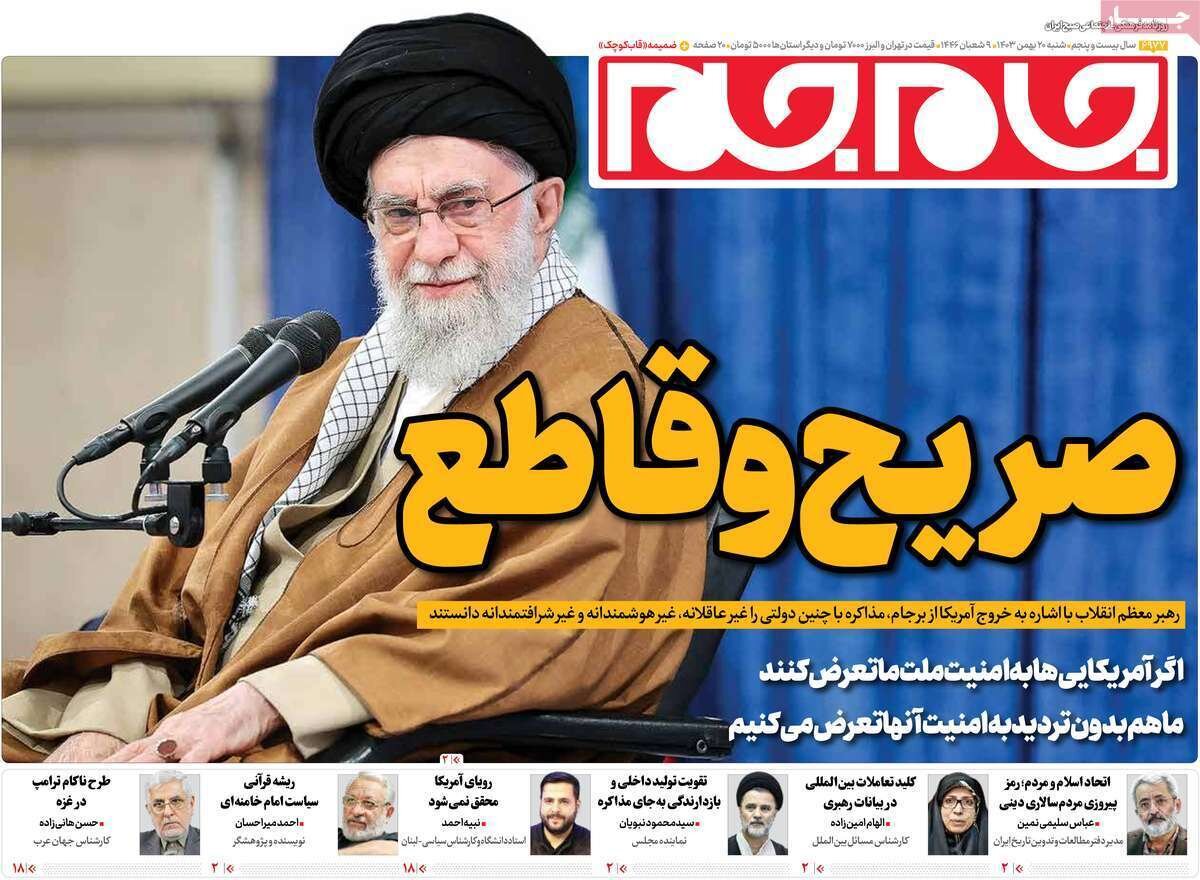The goals of Trump's scenario against a strong Iran

TEHRAN - In a note, Jam-e-Jam addressed Trump's recent statements including his admission that Iran is a strong country.
It wrote: Netanyahu said that Iran has become weak, but Trump has a different opinion. Iran has proven through numerous actions that it is strong. Trump claims that Iran was weakened during his first term due to maximum pressure and lack of money, but Biden strengthened Iran. Trump claims that he contained Iran in the first term, and now, due to Biden's policies, its conditions have improved and it has sold oil and, according to their claims, has disrupted the world. The U.S. President wants to achieve something for himself by praising Iran's strength and convincing the audience that we have reached an agreement with a strong Iran. In fact, from this point of view, any weakening of Iran in Trump's eyes will lead to criticism from critics against him who will argue: why did you negotiate or agree with a weak and defeated country?
Vatan-e-Emrooz: No possibility of negotiation
In a commentary, Vatan-e-Emrooz addressed Trump's sanctions against Iran. It wrote: One of the dangerous sanctions will reduce Iran's oil sales to zero. In addition to this sanction, the new U.S. government has begun extensive negotiations and lobbying with some countries to cut their trade with Iran. One of these pressures is related to the Iraqi government. It is pressing Baghdad to stop importing electricity and gas from Iran. Trump imposed unprecedented sanctions against Iran in his first term as president and then called for negotiations with Iran to obtain maximum concessions from Iran at the negotiating table by applying maximum pressure. This time, however, he is seemingly acting a little more intelligently. He is seeking dialogue and pressure simultaneously. Naturally, in such circumstances, there is no possibility of negotiation. That is, the U.S. government should not be provided with the possibility of negotiation. Negotiation in this case will probably lead to much greater damage than the one caused by the JCPOA.
Etemad: Smart diplomacy
In an article, Etemad discussed the recent developments in the U.S. foreign policy toward Iran. The paper said: The recent developments in the foreign policy of the United States, especially Trump's explicit statements about Iran, indicate changes in the American approach towards the Islamic Republic. Unlike his previous term (from 2017-2021, it seems Trump is now looking at the issue of Iran more realistically. This change of policy is influenced by American priorities at home. In such circumstances, the way Iran will deal with these developments can be extremely decisive. In the complex equation that has been formed between Iran, the United States, and Israel, Tehran’s decisions will specify the future course. Our country must adopt a policy based on rationality to prevent Washington from getting too close to Tel Aviv. Upon a combination of diplomatic rationality and domestic reforms, Iran must choose a path that will secure national interests and lead the country to counter current challenges.
Arman-e-Melli: Negotiation or sanctions?!
In an interview with Yousef Molaei, a senior expert in international law, Arman-e-Melli evaluated Trump's policy towards Iran and wrote: Trump's view on Iran has been somehow moderated compared to the past, but convincing the international community of Tehran's peaceful nuclear activities requires dialogue. The international community indeed seeks to be aware of Iran's (nuclear) activities. But at the same time, it is important to know by what mechanisms it wants to achieve this awareness. Countries around the world have generally followed this through the International Atomic Energy Agency and by implementing the Additional Protocols. That is, through intrusive inspections. The Agency's cameras are installed for this very reason. Iran has its principles that stand against the excesses of others. This policy has caused these countries to have a skeptical view of Iran's nuclear issue. Therefore, until there is no political understanding, it would not be possible to provide the necessary grounds for reaching an agreement on the nuclear issue.
